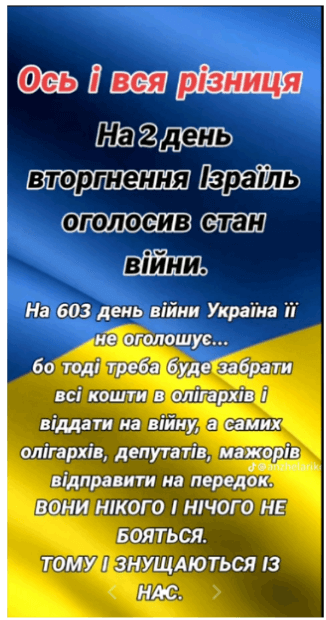Verification within Meta’s Third-Party Fact-Checking Program
The information is being spread online claiming that Ukraine deliberately does not declare a “state of war” instead of “martial law” because deputies and civil servants are dismissed and then mobilized. It is also claimed that power is transferred to the president and five main generals, oligarchs have all their funds seized, food is distributed through “ration cards,” and all citizens’ debts are written off. Additionally, it is said that extending martial law is prohibited, and instead, a state of war should finally be declared. Russian propaganda has previously spread the thesis that Ukraine deliberately does not declare a “state of war” because it benefits from this.
However, this is a fake. The “state of war” is solely about the foreign policy process of a state, formalizing the state between countries, whereas “martial law” pertains to internal policy. Currently, there are no official documents required to be in a state of war. Furthermore, Ukrainian legislation concerning combat actions and defense does not mention the dissolution of the Verkhovna Rada, the transfer of power to generals, the lifting of all citizens’ debts, and so forth.
Screenshot of the post
To begin with, it is worth understanding the difference between the concepts of “martial law” and “state of war.”
According to the laws “On Defense of Ukraine” and “On the Legal Regime of Martial Law,” “martial law” is a special legal regime introduced in the event of armed aggression or threat of attack to protect independence, territorial integrity, and national security. This involves delegating powers to relevant authorities and limiting constitutional rights and freedoms for a certain period. However, Article 64 of the Constitution of Ukraine specifies rights that cannot be restricted. For example, all citizens have equal rights and are equal before the law, the right to life, respect for dignity, and so on.
Ukrainian legislation provides little information about the state of war. For example, paragraph 9 of Article 85 of the Constitution states that the Verkhovna Rada, at the President’s request, declares a “state of war.” Article 4 of the “On Defense of Ukraine” law states that from the moment the state of war is declared or actual hostilities begin, martial law is in effect, which ends after the cessation of the state of war.
More details about the “state of war” can be found in international law. For example, in the Third Hague Convention on the Initiation of Hostilities, adopted on October 18, 1907, it is stated that hostilities cannot commence without prior notification to other states. However, in the UN Resolution “On Aggression” of 1974, invasion or attack by armed forces of one state into the territory of another state, bombardment, or blockade of ports is qualified as an act of aggression. Therefore, attention is primarily focused not on official documents mentioning the declaration of war but on the actions taken.
Politician and diplomat Andrii Shevchenko explained that the declaration of martial law is an internal matter, while the declaration of a state of war is external. The introduction of the former is not sufficient action. On the other hand, he points out that international law is focused not on statements but on actions, and therefore the Russian-Ukrainian confrontation is clearly a war. Historian and international journalist Yehor Brailian also indicates that the legal recognition of the war has already taken place.
On March 2, 2022, the UN General Assembly condemned Russia’s invasion and called for the immediate withdrawal of troops from Ukraine. Western countries have also repeatedly condemned Russia’s aggressive war.
Therefore, the “state of war” is exclusively a process of foreign policy of a state, which formalizes the relationship between countries, while the “martial law” is about internal policy. Currently, to be in a state of war, there is no requirement for official documents to formalize it.
Also, if we look at Ukrainian legislation on military actions and defense, we will not find any provisions that indicate the dissolution of the Parliament, food rationing, or the cancellation of all citizens’ debts during the “martial law” or “state of war.” Moreover, in the law “On the Legal Regime of Martial Law” or the Constitution, there are no restrictions on the duration of martial law. The only limitation is that the president cannot introduce or extend martial law without the consent of the parliament.
Attention
The authors do not work for, consult to, own shares in or receive funding from any company or organization that would benefit from this article, and have no relevant affiliations



